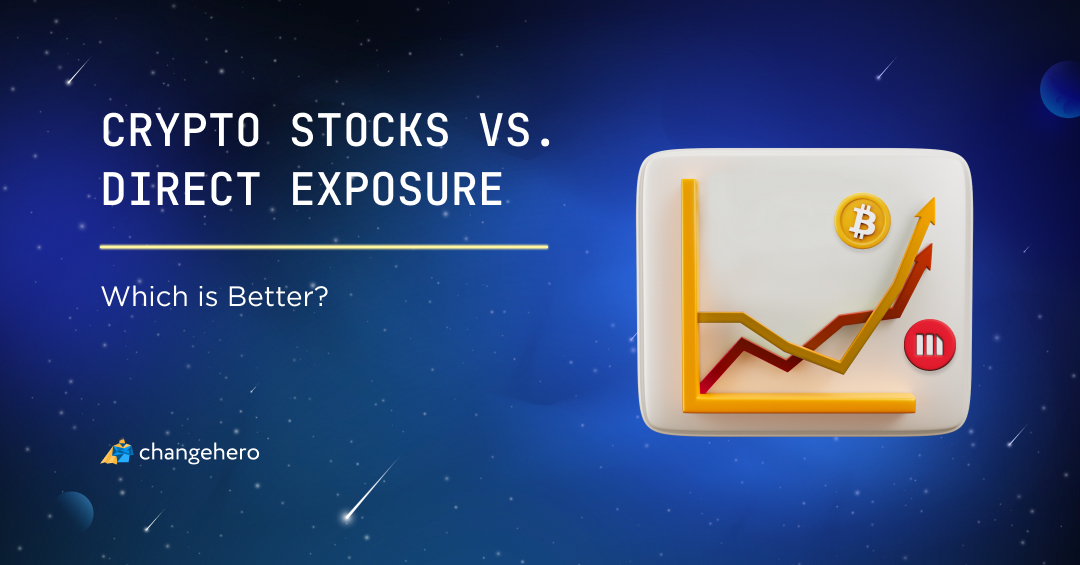Contents
Let’s talk about the three letters that make crypto traders queasy: FUD. What’s so bad about it? The ChangeHero team is here to explain what FUD stands for, what it is and isn’t, and give you some food for thought on how to deal with it.
Key Takeaways
- The definition of FUD is “fear, uncertainty, and doubt”. Its meaning is anything that can cause investor confidence or sentiment to drop significantly.
- Artificial FUD shares a lot of similarities with misinformation: unverifiable or anonymous sources, if any; bearish bias, and emotional messaging. Not all information that creates fear, uncertainty, and doubt is necessarily false, though.
- A popularized approach to dealing with FUD is to ignore it, and it works. However, labeling any and all negativity as “FUD” or shutting down everything with “4” is not productive and encourages irrational behavior.
What is FUD?

First things first: let’s get the definition out of the way. FUD is an acronym for “fear, uncertainty, and doubt”. Therefore, anything that is referred to as FUD is supposed to instill these emotions into traders and investors. Usually, things that get this label are media articles, rumors, memes, or social media posts.
The term FUD is not original to the crypto market. It originated in stock markets and finance, where the same methods of shifting market sentiment are used, allegedly or not. However, the crypto community is especially vigilant to this phenomenon, considering the volatility of crypto assets and how easily fake info can cause a dump.
What is the purpose of manipulating the market like that? By undermining investor confidence, FUD beneficiaries can damage the reputation of a crypto project and cause market participants to panic sell. In addition to short-term consequences, FUD also undermines confidence in the crypto market as a whole, which is especially frowned upon in the crypto circles. So, it should not be surprising that crypto investors are militant about FUD.
How to Spot FUD?

It is important to realize the difference between legitimate concerns and FUD. It is normal to have reservations or be cautious about investing. FUD refers to the less rational messaging to the extent of instilling panic and other negative emotions. What kind of negative information falls under this definition?
FUD is More Common in Bear Markets
Trying to stir the pot when the market participants exhibit greed and euphoria is not unheard of. It is not as effective as adding fuel to the fire when everyone is convinced that everything is going down.
Just like you should be on the lookout for anything FOMO-inducing in a bull market, try to filter the information you get during a bear market. You may be primed to believe whatever is in line with the current market sentiment more but this bias can make you ignore some important facts.
FUD is Often Unsubstantiated
If we understand FUD as false or exaggerated information, then like with misinformation, it is often hard to find a reliable source for the claims. The first red flag that should tip you off is the complete lack of a source. Valuable scoops can come from anonymous sources but you should pay attention to the outlet that published it. Even if it is a reputable source, take this information with a grain of salt. Finally, one of the most reliable ways to recognize misinfo is to cross-reference — check other sources for the claim. If there are reports (or reposts) that lead you back to a dubious source, it is likely to be false.
Another flavor of FUD comes in the form of narratives. Unlike occasional provocative pieces of information, some sources share different facts or claims that all support the same idea. These ideas can turn out to be true eventually (like it was with FTX) or be a persistent contrarian and unverifiable claim (e.g. Bitfinexed and their “Tether fraud”). Users and outlets that promote these narratives are often referred to as FUDders or FUDsters.
FUD Aims to Create an Emotional Response
As the name implies, the main goal of spreading negative information is to cause a drop in confidence. This tactic is also used when combating misinformation: try to see if the piece of information is trying to elicit some emotions in you. Is there any expressive language: adjectives, metaphors, analogies? Does it show any bias? Do you notice any exaggerations? Can you trust the source?
All that being said, does legitimate but negative news fall under the category of FUD? It is often dismissed as such, and this outlook is even encouraged. However, any rational person should know that the crypto world is not perfect. Analyzing negative news using knowledge about the crypto market rather than your emotions is the best course of action.
Ignore or Listen? What Should You Do

A common response to FUD is to ignore it and call to “HODL”, which is also one of the most common crypto terms. This popular in crypto circles abbreviation was originally a typo which later got a new expansion: “Hold On for Dear Life”. These calls, however, are somewhat disingenuous: usually, you wouldn’t know if the one giving this advice follows it. Should the FUD turn out to be true, do you want to be left holding the bag?
Will try to keep 2023 simple. Spend more time on less things. Do's and Don'ts.
— CZ 🔶 BNB (@cz_binance) January 2, 2023
1. Education
2. Compliance
3. Product & Service
4. Ignore FUD, fake news, attacks, etc.
In the future, would appreciate if you can link to this post when I tweet "4". 🙏
The “ignore FUD” approach was popularized by Binance’s ex-CEO and founder Changpeng “CZ” Zhao. The “4” response comes from a series of Twitter (X) posts in which he outlined some of his principles: the fourth point in the list was to “Ignore FUD, fake news, attacks, etc.” Since then, simply typing “4” in response to anything means it is dismissed as FUD to be ignored.
In the light of recent events, the thread and the meme received a whole new meaning. On the one hand, there is no arguing that CZ built a wildly successful business, and he remains wealthy and powerful. On the other hand, his current situation is more than precarious, putting it mildly: he is facing jail time in the US and has given up his leadership positions in an unprecedented settlement deal.
Was there FUD surrounding Binance before everything went down? For sure, and plenty of it. Were there any legitimate concerns raised? Yes, but any negativity ended up being dismissed. The whole “ignore FUD” deal devolved into closing one’s eyes to the problems in the cryptocurrency market and shutting down anyone who tried to point them out.
Conclusion
Now that the bear market is hopefully past us, we should see the abbreviation FUD less often. Nevertheless, knowing what it is and how to go about it should be useful at any time in the cryptocurrency market!
How do you feel about FUD? Let us and other crypto enthusiasts know in the comments on our social networks: X, Facebook, Reddit, and Telegram! Stay tuned to updates from the crypto market and explore other digital assets in our blog.
Frequently Asked Questions
What does the term FUD refer to in the crypto community?
FUD, or “fear, uncertainty, and doubt” means the same in crypto as in finance or stocks. It is the spread of negative information attempting to spook investors and cause wild swings in the price for the ones behind the FUD to profit.
What is an example of a FUD?
Despite being equated to misinformation, FUD does not always have to be outright false. Sometimes, misinterpreted news gets picked up and spread, causing crypto investors to panic. This happened in August 2022 to Solana, or with a USDC depeg in March 2023.
What does fudding mean in crypto?
“Fudding” is a crypto term derived from “FUD”. It means the action of spreading FUD or causing excessive negativity.












